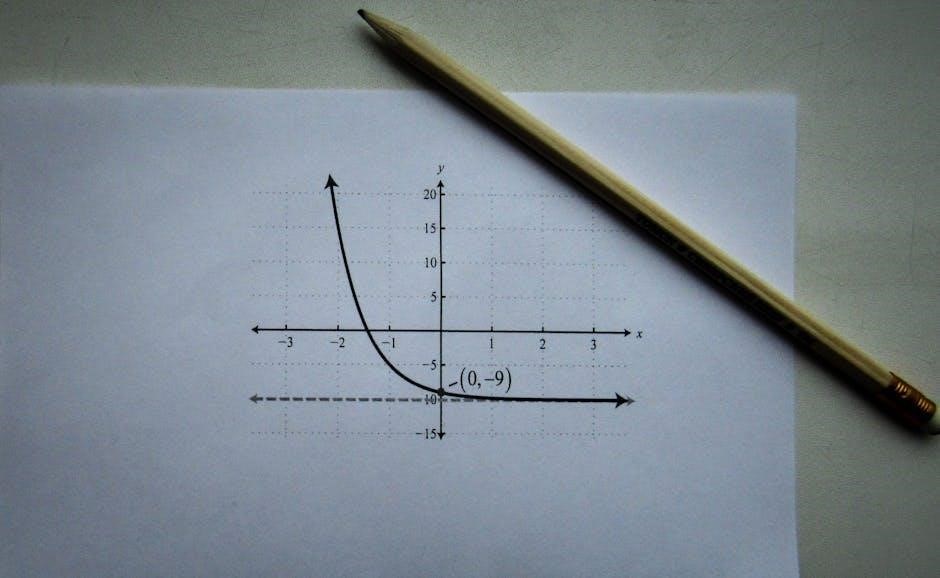Math Expressions Grade 6 is a comprehensive math curriculum designed to build foundational skills through interactive homework and structured answer keys, fostering problem-solving and critical thinking abilities in students.
1.1 What is Math Expressions Grade 6?

Math Expressions Grade 6 is a comprehensive math curriculum designed by Houghton Mifflin Harcourt to help students build foundational math skills. It focuses on areas like place value, whole number operations, fractions, decimals, and problem-solving strategies, preparing students for higher-level mathematics. The program emphasizes critical thinking, real-world applications, and clear communication of mathematical reasoning. Homework assignments and answer keys are integral components, providing students with structured practice and review opportunities. This curriculum is known for its interactive approach, making math engaging and accessible for Grade 6 learners. By combining hands-on activities with detailed answer keys, Math Expressions Grade 6 supports both independent practice and guided learning, ensuring a strong understanding of key concepts.
1.2 Importance of Homework and Answer Keys
Homework and answer keys play a vital role in the Math Expressions Grade 6 curriculum, serving as essential tools for reinforcing learning and assessing understanding. Homework assignments provide students with structured practice, allowing them to apply concepts learned in class and develop problem-solving skills. Answer keys offer immediate feedback, enabling students to identify and correct mistakes, which is crucial for mastering mathematical concepts. By reviewing homework with answer keys, students can track their progress, build confidence, and improve their overall math fluency. These resources are designed to support both independent study and guided learning, ensuring students have the support they need to succeed in Grade 6 math and beyond.

Structure of Math Expressions Grade 6 Homework
Math Expressions Grade 6 homework is structured to include foundational concepts, problem-solving activities, and real-world applications, providing a balanced approach to learning and reinforcing skills effectively.
2.1 Types of Questions and Activities
Math Expressions Grade 6 homework features a variety of question types and activities designed to engage students and reinforce learning. These include foundational skill exercises, such as place value drawings and identifying tens/ones, as well as application-based problems that involve word problems and real-world scenarios. Students also encounter critical-thinking activities like writing equations to solve problems and using mental math or estimation to verify answers. Additionally, the homework includes opportunities for practicing fractions, decimals, and metric measurements, ensuring a well-rounded understanding of key math concepts. Interactive elements, such as puzzles and projects, further enhance the learning experience, making math engaging and accessible for all students.
2.2 Skills Covered in Grade 6
Math Expressions Grade 6 focuses on mastering essential math skills, including place value, whole number operations, fractions, decimals, and metric measurements. Students develop proficiency in multiplication, division, and problem-solving strategies. The curriculum emphasizes mental math and estimation techniques to enhance numerical fluency. Additionally, it covers converting between fractions, decimals, and percentages, as well as understanding ratios and proportions. Problem-solving skills are reinforced through word problems and real-world applications, ensuring students can apply math to practical scenarios. The program also introduces algebraic concepts, such as writing and simplifying expressions and equations; These skills are designed to build a strong mathematical foundation, preparing students for higher-level math in subsequent grades.

Key Concepts in Math Expressions Grade 6
Key concepts include place value, whole number operations, fractions, decimals, and metric measurements. Students explore problem-solving strategies, algebraic expressions, and real-world applications to deepen mathematical understanding and fluency.
3.1 Place Value and Whole Number Operations
Place value and whole number operations form the cornerstone of mathematical proficiency in Grade 6. Students learn to interpret and represent numbers up to millions, focusing on digits, places, and their values.
Homework activities emphasize reading, writing, and comparing whole numbers, as well as rounding to the nearest ten, hundred, or thousand. Pupils also engage in operations like addition, subtraction, multiplication, and division of multi-digit numbers.
Key skills include solving real-world problems involving whole numbers and applying properties like commutative and associative laws. The answer key provides detailed solutions, reinforcing understanding and helping students identify errors in their calculations.
3.2 Fractions, Decimals, and Metric Measurements
Fractions, decimals, and metric measurements are essential components of Grade 6 math. Students learn to simplify fractions, add, subtract, and multiply mixed numbers, and convert between improper fractions and mixed numbers. Decimals are introduced through place value, with a focus on adding, subtracting, and multiplying decimals by whole numbers and other decimals. The curriculum also emphasizes understanding metric measurements, such as converting between units like meters, centimeters, and kilometers, and calculating perimeter, area, and volume. Word problems integrate these concepts, requiring students to apply them in real-world scenarios. The answer key provides step-by-step solutions, helping students verify their work and grasp complex calculations.

Problem-Solving Strategies in Grade 6 Math
Grade 6 math emphasizes mental math, estimation, and word problem-solving. Students learn to break down problems, use real-world contexts, and apply strategies like drawing diagrams or using equations.
4.1 Mental Math and Estimation Techniques
Mental math and estimation are essential skills in Grade 6 math, enabling students to solve problems quickly and check the reasonableness of their answers. These techniques involve rounding numbers, breaking down complex calculations, and using known facts to approximate solutions. For example, estimating sums or differences by rounding to the nearest ten or hundred. Students also learn to apply mental math strategies to real-world problems, such as calculating totals while shopping or measuring ingredients for cooking. Regular practice with mental math exercises in Math Expressions homework helps build confidence and fluency in mathematical thinking. Additionally, the answer key provides opportunities to verify estimations and refine these skills further, ensuring accuracy and efficiency in problem-solving.
4.2 Solving Word Problems Effectively
Solving word problems effectively is a critical skill in Grade 6 math, requiring students to translate real-world scenarios into mathematical equations. Math Expressions homework often includes word problems that involve fractions, decimals, and multi-step operations. To tackle these, students are encouraged to read carefully, identify key information, and choose the appropriate operation. For instance, problems might involve calculating distances, mixing ingredients, or determining costs. The answer key provides step-by-step solutions, helping students understand how to break down complex scenarios and verify their answers. Regular practice with word problems enhances critical thinking and mathematical reasoning, preparing students for practical applications in everyday life. Additionally, the structured approach in Math Expressions fosters confidence in addressing diverse problem types.

Using the Answer Key for Better Learning
The answer key provides clear solutions to homework problems, helping students verify their work and understand errors. It enhances learning by explaining concepts and reinforcing math comprehension;
5.1 How to Check Your Homework
To effectively check your homework using the answer key, start by comparing your answers with those provided. Review step-by-step solutions to understand problem-solving strategies. Identify mistakes by analyzing incorrect answers and understanding where you went wrong. Focus on concepts you struggled with and revisit relevant lessons or examples. Use the answer key to verify your understanding of each topic and ensure accuracy. Regularly checking your work helps improve problem-solving skills and builds confidence in math. By systematically reviewing homework, you can address weaknesses and master key concepts. This practice fosters a deeper understanding of mathematical principles and enhances overall academic performance. Make homework checking a consistent part of your study routine for better learning outcomes.

5.2 Learning from Mistakes
Learning from mistakes is a crucial part of the math learning process. When using the answer key to check homework, identify incorrect answers and understand where errors occurred. Review the steps you took and compare them with the correct solutions provided. Analyze patterns in your mistakes to pinpoint areas needing improvement; For example, if you consistently struggle with fraction operations, revisit those lessons or practice additional problems. Reflecting on errors helps solidify understanding and prevents repeating them. Use the answer key not just to verify answers but to gain insights into better problem-solving strategies. By addressing mistakes thoughtfully, you can turn weaknesses into strengths and build a stronger foundation in math.

Common Challenges in Grade 6 Math
Grade 6 math often presents challenges with fractions, decimals, and word problems. Students may struggle with mental math, time management, and applying concepts to real-world situations effectively.
6.1 Difficult Topics in Math Expressions Grade 6
In Math Expressions Grade 6, students often find fractions, decimals, and word problems challenging. Operations with fractions, such as adding and subtracting mixed numbers, can be complex. Converting between fractions and decimals requires precise understanding. Word problems involving multi-step solutions demand strong comprehension and application skills. Additionally, mental math and estimation techniques, while useful, can be difficult to master for some students. These topics require consistent practice and review to build confidence and proficiency. The answer key serves as a valuable resource to check homework and learn from mistakes, ensuring students grasp these essential math concepts effectively.
6.2 Time Management for Homework
Effective time management is crucial for completing Math Expressions Grade 6 homework efficiently. Students should create a structured study schedule, allocating specific time slots for each task. Prioritizing difficult topics, such as fractions or word problems, ensures they receive adequate attention. Breaking assignments into smaller sections can make them less overwhelming. Regular breaks help maintain focus and prevent burnout. Utilizing the answer key to check work saves time by identifying errors early. Encouraging a consistent routine fosters discipline and improves overall academic performance. By managing time wisely, students can balance homework with other activities, leading to better retention and understanding of math concepts.

Additional Resources for Practice
Supplemental resources include online tools, worksheets, and study guides to reinforce math concepts. HMH Go Math Answer Key PDF and Math Makes Sense Practice Books offer additional practice opportunities.
7.1 Online Tools and Worksheets
Various online tools and worksheets are available to support learning, such as HMH Go Math Answer Key PDF and Math Makes Sense Practice Books. These resources provide interactive exercises, printable worksheets, and step-by-step solutions to reinforce math concepts. Websites like Khan Academy and Mathway offer additional practice problems and video tutorials for difficult topics. Math Expressions Grade 6 Homework and Remembering Answer Key PDF is a valuable resource for students to review and master lessons. These tools cater to different learning styles, ensuring a well-rounded understanding of math. Regular practice using these materials helps build confidence and improves problem-solving skills. They are easily accessible and can be used at home or in the classroom for supplemental learning.
7.2 Recommended Study Materials
Several study materials are recommended to complement Math Expressions Grade 6, including textbooks, workbooks, and answer keys. The Math Makes Sense Practice and Homework Book Grade 6 PDF is a popular choice, offering detailed exercises and solutions. Additionally, the HMH Go Math Answer Key PDF provides step-by-step explanations for complex problems. Flashcards and study guides focused on place value, fractions, and algebra are also beneficial for quick review. Online resources like Khan Academy and Mathway offer video tutorials and interactive exercises. For a comprehensive understanding, students can use the Math Expressions Common Core Grades K-5 Answer Key. These materials help reinforce learning and provide additional practice opportunities, ensuring mastery of key math concepts. Regular use of these resources can significantly improve problem-solving skills and overall academic performance. They are widely available for free download, making them accessible to all students. Consistent practice with these materials is essential for achieving math proficiency.

Focus on Mathematical Practices
Mathematical reasoning, proof, and communication are emphasized, encouraging students to think critically and explain their solutions clearly.
8.1 Mathematical Reasoning and Proof
Mathematical reasoning and proof are essential skills in Grade 6 math, enabling students to logically justify their solutions and understand underlying concepts. Through problem-solving activities, students learn to construct viable arguments and critique reasoning. The curriculum encourages the use of visual models, algebraic expressions, and real-world examples to support proofs. Homework assignments often include word problems and equations that require students to demonstrate their reasoning. The answer key provides detailed explanations, helping students verify their solutions and understand different problem-solving approaches. This focus on mathematical reasoning prepares students for higher-level math by fostering critical thinking and analytical skills. Regular practice with proofs and justifications builds confidence and a deeper understanding of mathematical principles.
8.2 Communicating Mathematical Thinking
Communicating mathematical thinking is a vital skill in Grade 6 math, emphasizing the ability to clearly express problem-solving processes and solutions. Students learn to articulate their reasoning through verbal explanations, written descriptions, and visual representations. Homework assignments often include questions that require students to justify their answers, fostering clarity and precision in their communication. The answer key provides examples of well-structured solutions, guiding students in organizing their thoughts effectively. This practice helps students collaborate with peers, understand different problem-solving approaches, and prepare for real-world applications of math. By refining their communication skills, students build confidence in sharing their mathematical ideas and insights, which is essential for future academic success and teamwork in STEM fields.
Math Expressions Grade 6 provides a comprehensive curriculum, fostering problem-solving skills and critical thinking. Homework and answer keys guide students, encouraging independent learning and mastery of math concepts for future success.
9.1 Summary of Key Takeaways
The Math Expressions Grade 6 curriculum effectively builds foundational math skills through structured homework and answer keys, focusing on place value, whole number operations, fractions, decimals, and problem-solving strategies. Homework assignments emphasize mental math, estimation, and real-world applications, fostering critical thinking. The answer key serves as a valuable tool for self-assessment, allowing students to identify errors and improve understanding. The program encourages independent learning and mastery of concepts, preparing students for higher-grade challenges. By aligning with curriculum standards, Math Expressions Grade 6 ensures comprehensive coverage of essential math topics, making it an ideal resource for continuous learning and academic success.
9.2 Encouragement for Continuous Learning
Math Expressions Grade 6 empowers students to embrace math with confidence, fostering a growth mindset that encourages continuous learning. The curriculum’s interactive homework and answer keys provide clear guidance, helping students track their progress and understand areas for improvement. By engaging with diverse math topics, students develop problem-solving skills and a deeper understanding of mathematical concepts. Consistent practice builds resilience and a strong foundation for advanced math. Encourage students to view challenges as opportunities to grow and explore additional resources for extra support. With dedication and curiosity, they can master math and unlock future academic success. Keep learning, stay motivated, and celebrate every step forward!
